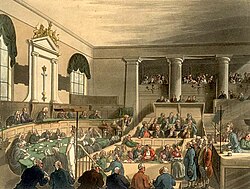| Criminal procedure |
|---|
| Criminal trials and convictions |
| Rights of the accused |
| Rights of the victim |
| Verdict |
| Sentencing |
| Post-sentencing |
| Related areas of law |
| Portals |
|

In law, a trial is a coming together of parties to a dispute, to present information (in the form of evidence) in a tribunal, a formal setting with the authority to adjudicate claims or disputes. One form of tribunal is a court. The tribunal, which may occur before a judge, jury, or other designated trier of fact, aims to achieve a resolution to their dispute. [1]
